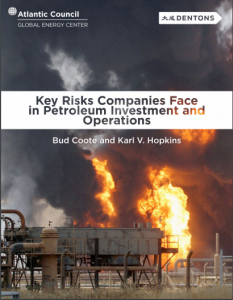Full Title: Key Risks Companies Face in Petroleum Investment and Operations
Author(s): Bud Coote & Karl V. Hopkins
Publisher(s): The Atlantic Council
Publication Date: January 1, 2017
Full Text: Download Resource
Description (excerpt):
This report will examine key risk factors that influence energy investment and operations worldwide and identify possible ways to mitigate risks and reduce uncertainty. Their impact has risen in importance in recent years as energy companies have invested in more developing countries, violence has grown more widespread, environmental and human rights issues have generated political criticism of companies, and oil prices have fallen.
The report will look at eight categories of risk: rule of law, sanctity of contract, infrastructure risk, personnel security, political criticism and reputational risks, financial risks, corruption, and cyberattacks. Climate change-related risk is addressed primarily as a financial risk, and the risk posed by populist movements in petroleum-producing countries is treated separately as a risk that cuts across many of the eight categories of risk listed above. This organization allows us to drill more deeply into the key risks. In fact, they are all interrelated and need to be appreciated and treated as such in any effective risk management program.
Various case studies including the examination of the February 24, 2006, terrorist attack on Abqaiq in Saudi Arabia; the January 16, 2013, terrorist attack on In Amenas in Algeria; the security approach to the BakuTbilisi-Ceyhan pipeline constructed between April 2003 and June 2006; pipeline disruptions in Nigeria; the Iran-Iraq war from September 1980 to August 1988; the first Persian Gulf war with Iraq that began in August 1990; and the conflict in Iraq beginning in March 2003 will be examined for lessons.
